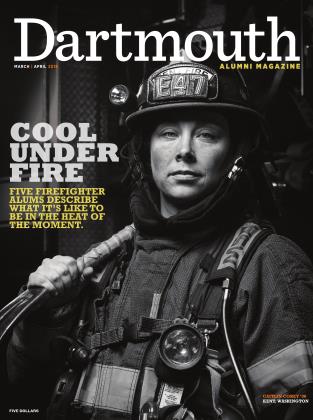EUREKA!
CAMPUS
[NEW FINDINGS AND RESEARCH]
Snowfall Rising Alaska precipitation unprecedented.
The Last Frontier’s glaciers are among the fastest melting in the world, yet snowfall has more than doubled in the region since 1840, according to a new study coauthored by assistant professor of earth sciences Erich Osterberg in Scientific Reports. Using ice cores drilled at Mount Hunter, Alaska’s third highest peak, Osterberg’s team analyzed more than 1,200 years of snowfall accumulation and discovered a massive increase in the 150 years following the Industrial Revolution. “We were shocked when we first saw how much snowfall has increased,” says Osterberg. The study notes that the increased precipitation is directly correlated to the warming surface temperatures of the Pacific and Indian oceans.
Misinformed
Fake news reach may be overstated.
The influence of fake news on the 2016 U.S. presidential election has been widely debated, despite a lack of hard data on the consumption of factually dubious articles. A new working paper coauthored by government professor Brendan Nyhan presents the first quantitative analysis of the browsing histories of votingage Americans in the run-up to the election combined with additional survey data to determine demographics and political preferences. Extrapolating from a sample of 2,500 web users, Nyhan’s team estimates that one in four potential voters visited at least one fake news website, which the researchers identify as displaying “little regard for journalistic norms or practices.” People over age 60 and Trump supporters were the most frequent consumers of fake news, and Facebook was one of the sites where people were most likely to be exposed to misinformation. “For all the hype about fake news, it’s important to recognize it only reached a subset of Americans, and most of them were already intense partisans,” says Nyhan.
 View Full Issue
View Full Issue
More From This Issue
-
 Feature
FeatureCan Investors Make Lots of Money and Save the World at the Same Time?
MARCH | APRIL 2018 By JIM COLLINS ’84 -
 Cover Story
Cover StorySome Like It Hot
MARCH | APRIL 2018 By RIANNA P. STARHEIM '14 -
 Feature
FeatureThe Art of War
MARCH | APRIL 2018 By Sean Plottner -
 On the Job
On the JobWhere the Lava Flows
MARCH | APRIL 2018 By Matthew Mosk ’92 -
 Personal History
Personal HistoryAwakening
MARCH | APRIL 2018 By JOE GLEASON ’77, JOE GLEASON ’77 -
 Interview
Interview“Oscar Night Is a Work Night”
MARCH | APRIL 2018 By Sean Plottner
Notebook
-
 notebook
notebookNEWS AND NOTES
JANUARY | FEBRUARY 2017 -
 notebook
notebookEUREKA!
JANUARY | FEBRUARY 2018 -
 notebook
notebookFROM THE ARCHIVES
NOVEMBER | DECEMBER 2018 -
 notebook
notebookLife Savers
MAY | JUNE 2022 By DAVID HOLAHAN -
 notebook
notebookWinning Trio
JULY | AUGUST 2021 By Maud McCole ’23 -
 notebook
notebookThe Art of Archery
JANUARY | FEBRUARY 2024 By NANCY SCHOEFFLER

